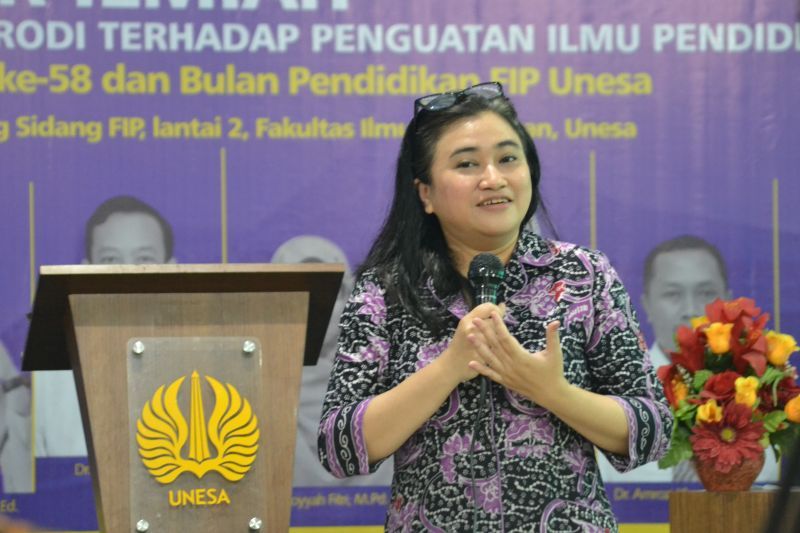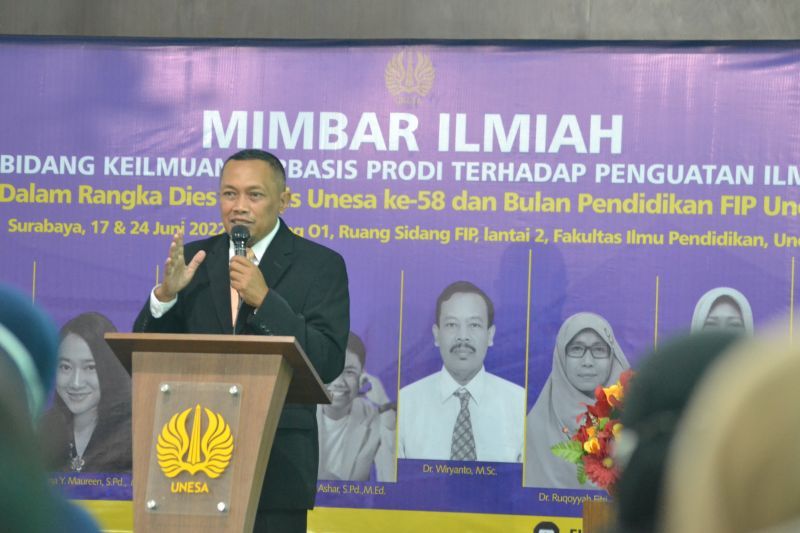
www.unesa.ac.id
Unesa.ac.id, SURABAYA - A number of lecturers and experts from various study programs (study programs) at the State University of Surabaya discussed "The Contribution of Study-Based Scientific Fields to Strengthening Educational Science" in the Scientific pulpit held by the Faculty of Education (FIP) UNESA at the FIP Building on Friday, 17 June 2022.
The activity for the 58th Anniversary of UNESA and the FIP Education Month was opened by Ganes Gunansyah as the chief executive and was followed by remarks from the Deputy Dean for Academic Affairs, Dr. Wagino, M.Pd. The Scientific pulpit is planned to become a routine program every Friday and is open. As an introduction, this program will be held on 17 and 24 June 2022.
Accompanied by the moderator, the first speaker was Dr. Amrozi Khamidi, M.Pd., a lecturer in Education Management who has an interest in entrepreneurship. He said that entrepreneurship can strengthen education from the elementary level to the tertiary level.
He hopes that all schools can apply entrepreneurship to expand the learning abilities of students and teachers, as well as establish institutional independence. “I hope that education can be like a mutually beneficial food chain. In a sense, later on, the community will be able to wake up and respond to the challenges of the times," said Amrozi.
The next speaker, the PGSD study program lecturer, Dr. Wiryanto, M.Sc., highlighted the relationship between the curriculum and the role of the teacher. Here, he invites the audience, including students to answer their questions and emphasizes that components of teaching skills are indispensable, such as pedagogy, content knowledge, and technology in changing times. "The establishment of an independent learning curriculum is a government policy to cover learning losses that occurred during the pandemic," he said.

www.unesa.ac.id
Meanwhile, Dr. Rofik Jalal Rosyanafi, M.Pd. presented his research on the concept of andragogy and porang farmers. Porang farmers have a learning orientation that is relevant to the problem. This shows that learning can occur as widely as possible. This corroborates his other research on learning to be able to teach and teach to learn.
After the three discussions that have been put forward by the previous presenters, as a closing topic, Dr. Irena Y. Maureen, S.Pd., M.Sc., a lecturer in Curriculum and Educational Technology, said that asynchronous learning has recently been applied. There were three problems raised by the woman who is often called Irena during asynchronous learning, namely engagement, expression, and collaboration. The problems that arise cause a high social wall for the outside and inside of students.
This first scientific pulpit was not only attended by students, but also lecturers up to the level of professors. The lively atmosphere of the forum shows a positive reaction from the audience because it is closely related to the future of educators who are part of the goals or outcomes of the Faculty of Education.
In addition to these resource persons, the Scientific pulpit which was held during the two main sessions during the introduction period also involved other resource persons; Dr. Elisabeth Christiana, M.Pd., Guidance and Counseling Lecturer, Dr. Damajanti Kusuma Dewi, S.Psi., M.Sc., Lecturer of Psychology, Dr. Ruqoyyah Fitri, M.Pd., PG PAUD Lecturer, and Muhammad Nurul Ashar, S.Pd., M.Ed., Lecturer for Special Education. [UNESA PR]
Author: Faizur Rahmatin
Editor: @zam Al'asyiah
Share It On:






